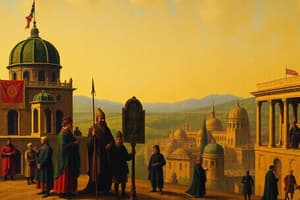Podcast
Questions and Answers
What does the concept of Wu Wei emphasize in Dao De Jing?
What does the concept of Wu Wei emphasize in Dao De Jing?
What is one of the key tenets of Legalism as established by Han Fei?
What is one of the key tenets of Legalism as established by Han Fei?
Which achievement is associated with the Qin Dynasty under Shi Huangdi?
Which achievement is associated with the Qin Dynasty under Shi Huangdi?
How did the Silk Road impact the connected empires?
How did the Silk Road impact the connected empires?
Signup and view all the answers
Which innovation is credited to the Han Dynasty?
Which innovation is credited to the Han Dynasty?
Signup and view all the answers
Which of the following best describes the Four Noble Truths in Buddhism?
Which of the following best describes the Four Noble Truths in Buddhism?
Signup and view all the answers
What pivotal role did Ashoka play in the Maurya Empire?
What pivotal role did Ashoka play in the Maurya Empire?
Signup and view all the answers
Which characteristic is associated with the Gupta Empire's influence on Indian society?
Which characteristic is associated with the Gupta Empire's influence on Indian society?
Signup and view all the answers
What is a fundamental principle of Confucianism that emphasizes respect within family structures?
What is a fundamental principle of Confucianism that emphasizes respect within family structures?
Signup and view all the answers
How did Buddhism fundamentally differ from Hinduism in terms of the self?
How did Buddhism fundamentally differ from Hinduism in terms of the self?
Signup and view all the answers
What is meant by the term 'Middle Path' in Buddhism?
What is meant by the term 'Middle Path' in Buddhism?
Signup and view all the answers
Which of the following is NOT a branch of Buddhism?
Which of the following is NOT a branch of Buddhism?
Signup and view all the answers
What was one of the major contributions of Daoism to Chinese philosophy?
What was one of the major contributions of Daoism to Chinese philosophy?
Signup and view all the answers
What was a significant contribution of Darius I to the Persian Empire?
What was a significant contribution of Darius I to the Persian Empire?
Signup and view all the answers
Which belief is central to Zoroastrianism?
Which belief is central to Zoroastrianism?
Signup and view all the answers
Which of the following terms relates to the administrative organization of the Persian Empire?
Which of the following terms relates to the administrative organization of the Persian Empire?
Signup and view all the answers
What does the term 'Moksha' refer to in Hinduism?
What does the term 'Moksha' refer to in Hinduism?
Signup and view all the answers
Which figure is known as the founder of Buddhism?
Which figure is known as the founder of Buddhism?
Signup and view all the answers
What role did roads play in the administration of the Persian Empire?
What role did roads play in the administration of the Persian Empire?
Signup and view all the answers
Which of the following concepts describes the moral duties in Hinduism?
Which of the following concepts describes the moral duties in Hinduism?
Signup and view all the answers
Which of the following best describes the influence of Zoroastrianism on monotheistic religions?
Which of the following best describes the influence of Zoroastrianism on monotheistic religions?
Signup and view all the answers
Study Notes
Classical Civilizations Part I (Persia/China/India)
- Important Reminders: The study guide is an outline of key topics, people, and events. Everything discussed, noted, read, watched, or done is fair game for assessments
- History as a Story: Focus on the motives, decisions, and behaviors of individuals to understand the historical context and make chronology easier to remember.
- Geography: Review maps to identify political boundaries of empires and dynasties, along with key physical features.
-
The Persians:
- Cyrus and Darius I/Xerxes expanded the empire.
- Administration and Organization (Satraps, roads, Capital of Persepolis) were crucial to success.
- Zoroastrianism: a religion with core beliefs of dualism and the prophet Zarathustra.
- The role of the religion in the empire
-
Classical India:
- Hinduism: one God (Brahman) with various forms (Ganesha, Vishnu, Shiva), focusing on the interconnected concepts (caste, dharma, karma, samsara, atman, moksha)
- Buddhism: Key figures like Siddhartha Gautama and their concepts like Four Noble Truths and Eightfold Path.
-
Confucianism:
- Confucius (circa 550 BCE) and the importance of his teachings.
- The Analects, the Five Relationships, Filial Piety
- Confucian government and civil service exams.
-
Daoism:
- Lao Tzu (circa 600 BCE) and the significance of the Dao, or “The Way.”
- Wu Wei
-
Legalism:
- Han Fei and the importance of the strict laws and harsh punishments in their rule, especially in The Qin dynasty.
-
Empires:
- Maurya (321-185 BCE) and Gupta (320-550 CE) Empires, focusing on their leaders, policies and achievements.
-
Classical China:
- Han dynasty (206 BCE-220 CE): Contributions of important emperors, Silk Road trade, social changes, and achievements (e.g., paper, advancements in science).
Studying That Suits You
Use AI to generate personalized quizzes and flashcards to suit your learning preferences.
Related Documents
Description
Explore the rich histories of Persia, China, and India in this quiz. Focus on key figures like Cyrus and Darius, the significance of Zoroastrianism, and the foundations of Hinduism. Review geography, important events, and cultural connections that shaped these classical civilizations.




